

20th Century Dystopias. The Handmaid's Tale (wiki) The Handmaid's Tale - Official Trailer (1990) The Handmaid's Tale - Salvaging/Particicution Scene. The Handmaid's Tale (complete film) The Handmaid's Tale (audiobook) Nineteen Eighty-Four. History and title[edit] A 1947 draft manuscript of the first page of Nineteen Eighty-Four, showing the editorial development.
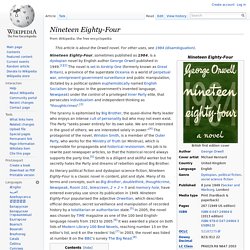
The Last Man in Europe was an early title for the novel but in a letter dated 22 October 1948 to his publisher Fredric Warburg, eight months before publication, Orwell wrote about hesitating between The Last Man in Europe and Nineteen Eighty-Four.[14] Warburg suggested changing the main title to a more commercial one.[15] Copyright status[edit] NINETEEN EIGHTY-FOUR (1984) Richard Burton, John Hurt (FULL MOVIE IN ENGLISH) 1984 George Orwell Movie Trailer (1984) Orwell's 1984 (etext) Nineteen Eighty-four, by George Orwell Table of Contents Chapter 1 Chapter 2 Chapter 3 Chapter 4 Chapter 5 Chapter 6.
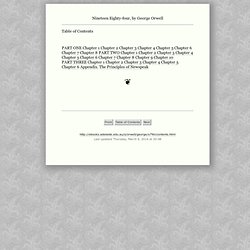
Brave New World (wiki) Classic 1932 science fiction novel by Aldous Huxley In 1999, the Modern Library ranked Brave New World as #5 on its list of the 100 best English-language novels of the 20th century.[2] In 2003, Robert McCrum, writing for The Observer, included Brave New World chronologically at #53 in "the top 100 greatest novels of all time",[3] and the novel was listed at #87 on The Big Read survey by the BBC.[4] Title[edit] O wonder!
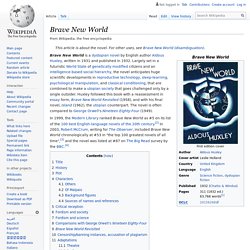
How many goodly creatures are there here! How beauteous mankind is! A Brave New World read by Huxley himself. Brave New World by Aldous Huxley (etext) Chapter One A SQUAT grey building of only thirty-four stories.
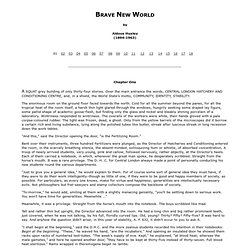
Over the main entrance the words, CENTRAL LONDON HATCHERY AND CONDITIONING CENTRE, and, in a shield, the World State's motto, COMMUNITY, IDENTITY, STABILITY. The enormous room on the ground floor faced towards the north. Cold for all the summer beyond the panes, for all the tropical heat of the room itself, a harsh thin light glared through the windows, hungrily seeking some draped lay figure, some pallid shape of academic goose-flesh, but finding only the glass and nickel and bleakly shining porcelain of a laboratory.
Wintriness responded to wintriness. Aldous Huxley's Brave New World. News from Nowhere (wiki) The book explores a number of aspects of this society, including its organisation and the relationships which it engenders between people.
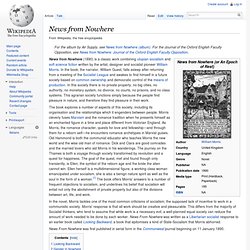
Morris cleverly fuses Marxism and the romance tradition when he presents himself as an enchanted figure in a time and place different from Victorian England. As Morris, the romance character, quests for love and fellowship—and through them for a reborn self—he encounters romance archetypes in Marxist guises. Old Hammond is both the communist educator who teaches Morris the new world and the wise old man of romance.
Dick and Clara are good comrades and the married lovers who aid Morris in his wanderings. The journey on the Thames is both a voyage through society transformed by revolution and a quest for happiness. News From Nowhere (audiobook) William MORRIS (1834 - 1896) News from Nowhere (1890) is a classic work combining utopian socialism and soft science fiction written by the artist, designer and socialist pioneer William Morris.

In the book, the narrator, William Guest, falls asleep after returning from a meeting of the Socialist League and awakes to find himself in a future society based on common ownership and democratic control of the means of production. In this society there is no private property, no big cities, no authority, no monetary system, no divorce, no courts, no prisons, and no class systems. This agrarian society functions simply because the people find pleasure in nature, and therefore they find pleasure in their work. News from Nowhere, by William Morris (etext) Looking Backward (wiki) Looking Backward: 2000-1887 is a utopian science fiction novel by Edward Bellamy, a lawyer and writer from Chicopee Falls, Massachusetts; it was first published in 1888.
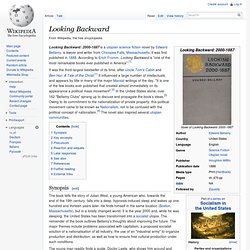
According to Erich Fromm, Looking Backward is "one of the most remarkable books ever published in America".[1] Synopsis[edit] Looking Backward, by Edward Bellamy (etext) Bellamy's Looking Backward (audiobook) Plato's Republic (wiki) Three interpretations of the Republic are presented; they are not exhaustive in their treatments of the work, but are examples of contemporary interpretation.
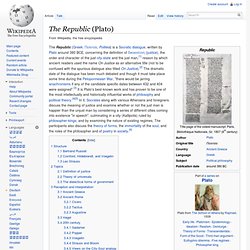
In his A History of Western Philosophy (1945), Bertrand Russell identifies three parts to the Republic:[7] Books I–V: the eutopia portraying the ideal community and the education of the Guardians, parting from attempting to define justice;Books VI–VII: define “philosopher”, since philosophers are the ideal rulers of such a community;Books VIII–X: discuss the pros and cons of various practical forms of government. Francis Cornford, Kurt Hildebrandt (de), and Eric Voegelin contributed to an establishment of sub-divisions marked with special formulae in Greek: Prologue I.1. 327a—328b. I.2—I.5. 328b—331d. I.6—1.9. 331e—336a. I.10—1.24. 336b—354c. Introduction II.1—II.10. 357a—369b. More's Utopia (wiki) Utopia (in full: De optimo reip. statv, deque noua insula Vtopia, libellus uere aureus, nec minus salutaris quam festiuus ) is a work of fiction and political philosophy by Thomas More published in 1516.
More's Utopia (audiobook) Thomas MORE (1478 - 1535), translated by Gilbert BURNET (1643 - 1715) This book is all about the fictional country called Utopia.

It is a country with an ‘ideal’ form of communism, in which everything really does belong to everybody, everyone does the work they want to, and everyone is alright with that. This country uses gold for chamber pots and prison chains, pearls and diamonds for children’s playthings, and requires that a man and a woman see each other exactly as they are, naked, before getting married. More's Utopia (eText) Butler's Erewhon (wiki) The first few chapters of the novel dealing with the discovery of Erewhon are in fact based on Butler's own experiences in New Zealand where, as a young man, he worked as a sheep farmer on Mesopotamia Station for about four years (1860–1864), and explored parts of the interior of the South Island and which he wrote about in his A First Year in Canterbury Settlement (1863).
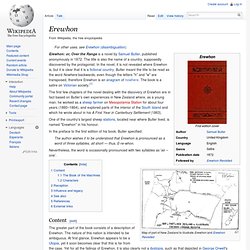
In the preface to the first edition of his book, Butler specified: The author wishes it to be understood that Erewhon is pronounced as a word of three syllables, all short — thus, E-re-whon. Nevertheless, the word is occasionally pronounced with two syllables as 'air – one'. Content[edit] Erewhon (ebook) Share Email Facebook Twitter Google+ Lockerz Grab Delicious Digg Google Bookmarks MySpace StumbleUpon Reddit By Lockerz Victoria University of Wellington Library [advanced search] ▼ About this page Title: Erewhon: or Over the Range Author: Samuel Butler.
Erewhon by Samuel Butler (audiobook) Overview (wiki) The utopia and its offshoot, the dystopia, are genres of literature that explore social and political structures. Utopian fiction is the creation of an ideal society, or utopia, as the setting for a novel. Dystopian fiction (sometimes referred to as apocalyptic literature) is the opposite: creation of an utterly horrible or degraded society that is generally headed to an irreversible oblivion, or dystopia.[1] Many novels combine both, often as a metaphor for the different directions humanity can take in its choices, ending up with one of two possible futures. Both utopias and dystopias are commonly found in science fiction and other speculative fiction genres, and arguably are by definition a type of speculative fiction. More than 400 utopian works were published prior to the year 1900 in the English language alone, with more than a thousand others during the twentieth century.[2] Subgenres[edit] Utopian fiction[edit] Dystopian fiction[edit]